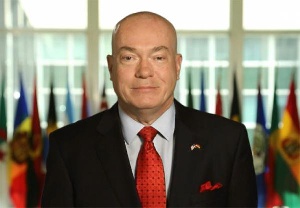 Robert P. Jackson, US Ambassador to Ghana
Robert P. Jackson, US Ambassador to Ghana
Funds from the much-awaited Millennium Challenge Compact II should start coming in the next two months, United States Ambassador to Ghana Robert P. Jackson has said -- stressing that reliable electricity, which the fund is meant to support, “is absolutely essential for Ghana’s industrial growth”.
A total of US$497.5million is expected from the compact; but the amount will be released in bits based on the fulfilment of certain conditions by Ghana in the five-year implementation period.
An initial investment of up to US$149.6million is expected to be provided for putting the country’s main distribution company, the Electricity Company of Ghana (ECG), on the path to sustainability.
Speaking at a media conference in Accra, United States Ambassador to Ghana Robert P. Jackson said: “We are in the process of working with government to finalise the conditions. I am hopeful that within, approximately, the next 60 days we will actually begin disbursing funding to the energy sector, and hope to ensure more reliable electricity supply.
He said: “Based on what we’ve seen, having reliable electricity is absolutely essential for industrial growth for this country; and I think the investment is a great and timely investment.
He added: “The President will always agree on the conditions, and some of the outstanding issues remain approval of the gas master plan by cabinet and the release of a request for proposals by management of ECG, and we are very close on both of those things”.
The Compact-Two of the Millennium Challenge Account between the two countries is aimed at transforming the ECG and other power sector agencies.
The ECG is said to require significant investments of not less than US$200million per year to address its investment gap in order to meet the annual power demand growth rate of about 10 percent.
It is among the largest power distribution utilities in sub-Saharan Africa, with over three million registered customers and over 6,000 Gigawatt Hour (GWh) of electricity sold per annum.
Its service area covers approximately 36 percent of Ghana‘s territory and accounts for 18.12 million people (73.5 percent), of which 57.6 percent live in urban areas.
As part of the Millennium Challenge Account grant conditions, the ECG is expected to be handed over to a Concessionaire in January 2017 -- with the concession period being 25 years, subject to compliance with terms of the concession agreement by the concessionaire.
Available information shows that about 40 companies have shown interest in the project, with eighteen of them being indigenous Ghanaian owned while the remaining 24 are from 14 different foreign countries.
Under the ECG PSP Transaction agreement, assets will still be 100% owned by the state, and the electricity market will still be regulated by the Public Utility Regulatory Commission.
“Government’s objective for the PSP in ECG is to have a technically and financially sound ECG, which is key to making Ghana’s power sector a vital engine of the country’s development,” said Mr. John Jinapor, the Deputy Minister for Power.
Government, the minister said, will not renege on its responsibility to take the right and appropriate decisions that will propel the economy forward.
“Ultimately, it is the well-being and long-term benefit of Ghanaians that government is interested in, and that is what has precipitated the decision to have private participation in the ECG,” said the Deputy Minister.
In November 2013, government submitted a concept-paper proposal to the MCC board of directors to support power generation and distribution in the country.
Ghana’s demand for power is growing at around 10% per annum, spurred by robust economic growth and rising consumption.